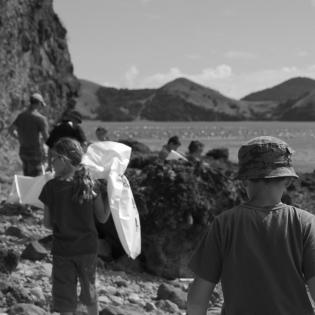Reducing Plastic Consumption
The youth take action by determining ways to reduce their own use of plastic bags and by advocating for ways to reduce the use of plastic bags in their own households, the community, state and nation. To take further action, they may propose ways to influence government officials to change laws so plastic bags are banned, taxed, or not given out for free.
The learner will:
- review the water cycle and understand water as a common resource
- share information through posters and letters about plastic bags with family, community, and lawmakers.
- make a personal commitment to reduce consumption of plastic and plastic bags.
water cycle: the existence and movement of water on, in, and above the Earth.
- What can we do today to reduce the problem of plastic bag pollution?
- Who cares about this issue locally and globally? How might you get others to care about and act on this issue?
Instructions
Anticipatory Set
Hold up a glass of water. Propose that the H2O molecules of water in this glass may have fallen on the heads of dinosaurs, washed the hands of Civil War soldiers, satisfied the thirst of Olympic athletes or flowed down the Amazon River along with the crocodiles. Ask: How can that be? Remind them of the water cycle: precipitation, infiltration, evaporation, condensation, and precipitation.
Polluted water affects us all now and in the future because water is a common resource we share with all people and animals. What we do locally ends up in the global water system. Water is never created; it is recycled and shared repeatedly.
Keeping water clean is beneficial for the common good.
Put five pieces of chart paper around the room. Assign groups of three or four to each paper. Write the following questions at the top of the charts (one question per paper):
- What are creative ways to reuse plastic bags?
- Where do you get plastic bags/who gives them to you?
- Where are some strange places you have seen a plastic bag?
- What are some ways that plastic bags harm the environment?
- What plastic products can you stop buying or using because you can do without them?
Give groups two minutes to share their thoughts at one chart paper. Have them move to the next chart paper and add to the brainstorming of the previous group. Repeat until all groups have added ideas to all charts. When the groups are back to their original charts, have them star the two or three best ideas from the chart and read them to the whole group. Post the charts for everyone to read .
Through discussion, come to a consensus on what action they will take. Guide the youth in planning and implementing that advocacy. This might include letters to government officials to change laws or a campaign to promote reusable grocery bags.
They carry out their planned project.
Youth may sign personal statements to promise to reduce their use of plastic and plastic bags. They may use their communication skills (verbal, written, and technology) to share their information with others and spread the word of the importance of avoiding plastic. They may research cities, states, and countries that have banned the use of plastic bags. They may write to municipal and state legislators about the need to limit the use of plastic bags. Youth may be ready to write letters to lawmakers requesting that a law require local stores to charge for plastic bags. They may support a national effort to raise awareness about reducing the use of plastic bags. They may design and sell reusable bags locally.
Philanthropy Framework
-
Strand PHIL.I Definitions of Philanthropy
-
Standard DP 01. Define Philanthropy
-
Benchmark E.3 Recognize that citizens have a responsibility for the common good as defined by democratic principles.
-
-
Standard DP 02. Roles of Government, Business, and Philanthropy
-
Benchmark E.1 Give examples of needs met by government, business, civil society, and family.
-
-
-
Strand PHIL.II Philanthropy and Civil Society
-
Standard PCS 07. Skills of Civic Engagement
-
Benchmark E.2 Discuss an issue affecting the common good in the classroom or school and demonstrate respect and courtesy for differing opinions.
-
-
-
Strand PHIL.IV Volunteering and Service
-
Standard VS 01. Needs Assessment
-
Benchmark E.1 Identify a need in the school, local community, state, nation, or world.
-
-
Standard VS 02. Service and Learning
-
Benchmark E.1 Select a service project based on interests, abilities, and research.
-
-
Standard VS 03. Providing Service
-
Benchmark E.1 Provide a needed service.
-
-
